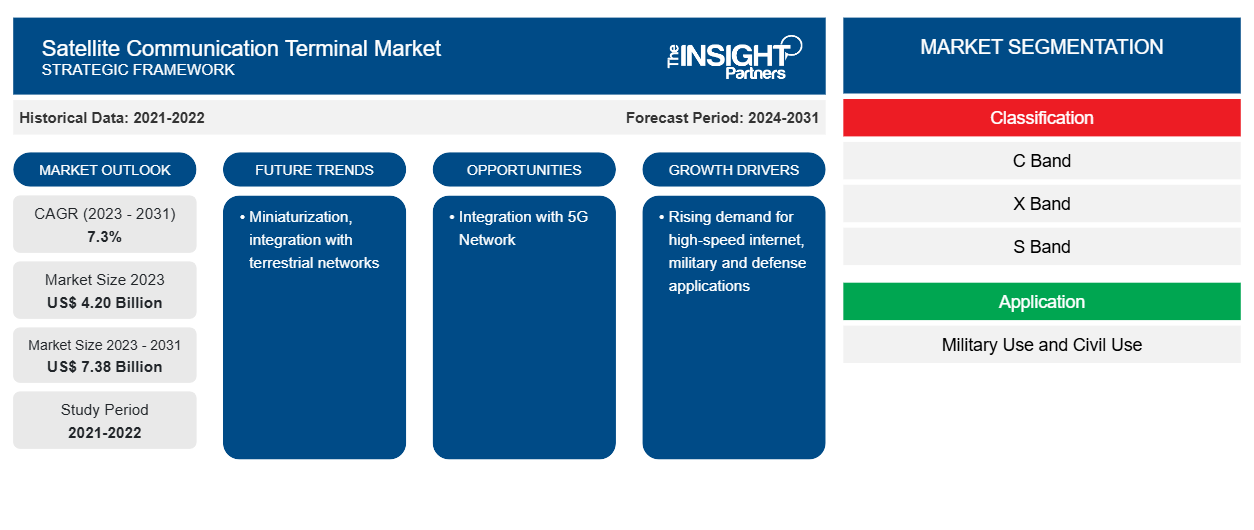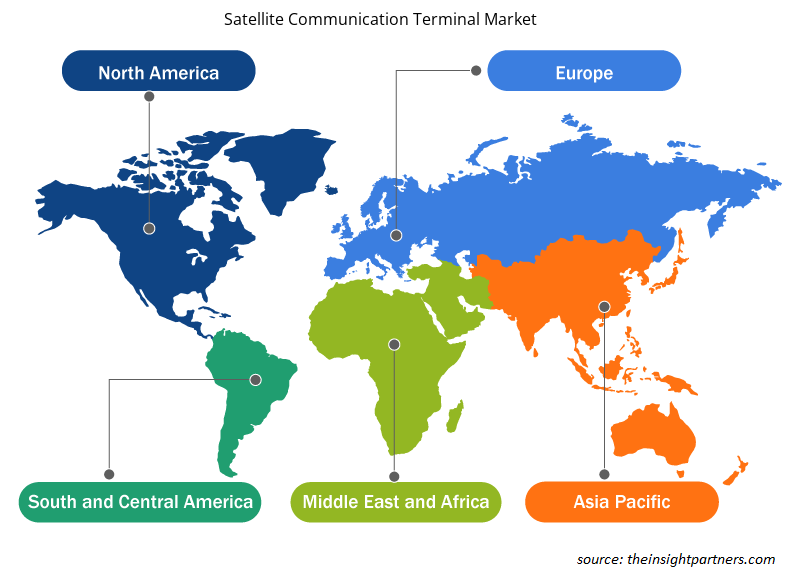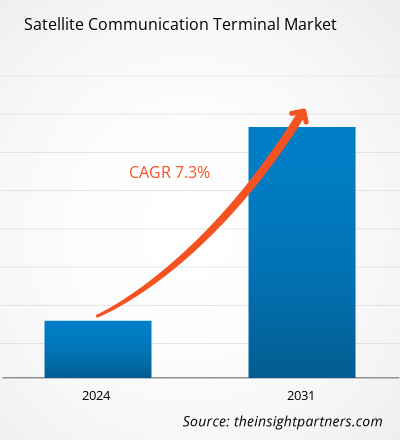The satellite communication terminal market size is projected to reach US$ 7.38 billion by 2031 from US$ 4.20 billion in 2023. The market is expected to register a CAGR of 7.3% during 2023–2031. Miniaturization and integration with terrestrial networks are likely to remain a key trend in the market.
Satellite Communication Terminal Market Analysis
A SATCOM terminal, short for Satellite Communications Terminal, is a device that establishes communication linkages via satellites. It includes an antenna for signal transmission and reception, a modem for data modulation and demodulation, and, in some cases, signal amplifiers. The terminal communicates with satellites orbiting the Earth, which transmit messages to ground stations or other terminals. This technique permits long-distance communication in remote or inaccessible locations.
Satellite Communication Terminal Market Overview
Satellite communications terminals have a wide variety of uses. They are used in military operations to ensure secure and reliable communication, in aviation for air traffic control and aircraft communication, in maritime for vessel tracking and safety communications, in disaster response to establish emergency communication, in broadcasting to transmit TV and radio signals, and in remote areas where terrestrial networks do not exist.
Customize This Report To Suit Your Requirement
You will get customization on any report - free of charge - including parts of this report, or country-level analysis, Excel Data pack, as well as avail great offers and discounts for start-ups & universities
Satellite Communication Terminal Market: Strategic Insights

- Get Top Key Market Trends of this report.This FREE sample will include data analysis, ranging from market trends to estimates and forecasts.
You will get customization on any report - free of charge - including parts of this report, or country-level analysis, Excel Data pack, as well as avail great offers and discounts for start-ups & universities
Satellite Communication Terminal Market: Strategic Insights

- Get Top Key Market Trends of this report.This FREE sample will include data analysis, ranging from market trends to estimates and forecasts.
Satellite Communication Terminal Market Drivers and Opportunities
Rising Military and Defense Applications to Favor the Market
Military units use communication satellites to organize and coordinate their infantry and field units. They enable tactical communication on the go and maybe simply integrated into vehicles, naval vessels, and airplanes. SATCOM is a critical component of the military's C4ISR system (Command, Control, Communications, Computers, Intelligence, Surveillance, and Reconnaissance). It permits real-time communication between dispersed forces, navigation, and remote monitoring, all of which improve the efficiency of military operations. With technological developments, the quality, speed, and accuracy of satellite communication have substantially improved, allowing for greater strategic planning and execution. In November 2023, Intelsat announced that it would soon provide the U.S Army with new, flexible, and fully managed multi-orbit satellite communications (SATCOM) support, following the award of the Army’s first-ever Satellite Communication (SATCOM) as a Managed Service (SaaMS) contract. This is driving the market growth.
Integration with 5G Network
SATCOM and 5G can be combined to form a network that offers seamless connectivity across many communication technologies, such as cellular, Wi-Fi, and satellite. This integrated network is suitable for a variety of applications, including remote sensing, unmanned vehicles, and augmented reality. In an Electronic Warfare (EW) scenario, SATCOM and 5G can collaborate to provide secure and durable communication capabilities resistant to jamming, interception, and other forms of interference. SATCOM can provide a backup communication channel in the event that the terrestrial network is jammed or disrupted, whereas 5G can provide a secure and robust communication network for local communication between various units and platforms.
Satellite Communication Terminal Market Report Segmentation Analysis
Key segments that contributed to the derivation of the satellite communication terminal market analysis are classification and application.
- Based on the classification, the satellite communication terminal market is divided into C band, X band, S band, Ku band, and Ka band.
- Based on the application, the market is divided into military use and civil use. The military use segment held the largest share in 2023.
Satellite Communication Terminal Market Share Analysis by Geography
The geographic scope of the satellite communication terminal market report is mainly divided into five regions: North America, Asia Pacific, Europe, Middle East & Africa, and South & Central America.
North America dominated the satellite communication terminal market share in 2023. Countries in the region, such as the US and Canada, have high investments in the defense sector. In August 2021, the US Navy awarded a contract for 16 satellite communication terminals to L3Harris Technologies, Inc. This contract is said to be worth US$ 18 million and is expected to provide access to commercial broadband communications during maritime operations. This is driving the growth of the market in the region.
Satellite Communication Terminal Market Regional Insights
The regional trends and factors influencing the Satellite Communication Terminal Market throughout the forecast period have been thoroughly explained by the analysts at The Insight Partners. This section also discusses Satellite Communication Terminal Market segments and geography across North America, Europe, Asia Pacific, Middle East and Africa, and South and Central America.

- Get the Regional Specific Data for Satellite Communication Terminal Market
Satellite Communication Terminal Market Report Scope
| Report Attribute | Details |
|---|---|
| Market size in 2023 | US$ 4.20 Billion |
| Market Size by 2031 | US$ 7.38 Billion |
| Global CAGR (2023 - 2031) | 7.3% |
| Historical Data | 2021-2022 |
| Forecast period | 2024-2031 |
| Segments Covered |
By Classification
|
| Regions and Countries Covered | North America
|
| Market leaders and key company profiles |
Satellite Communication Terminal Market Players Density: Understanding Its Impact on Business Dynamics
The Satellite Communication Terminal Market is growing rapidly, driven by increasing end-user demand due to factors such as evolving consumer preferences, technological advancements, and greater awareness of the product's benefits. As demand rises, businesses are expanding their offerings, innovating to meet consumer needs, and capitalizing on emerging trends, which further fuels market growth.
Market players density refers to the distribution of firms or companies operating within a particular market or industry. It indicates how many competitors (market players) are present in a given market space relative to its size or total market value.
Major Companies operating in the Satellite Communication Terminal Market are:
- Airbus
- AVL Technologies
- Collins Aerospace
- General Dynamics Mission Systems, Inc.
- Honeywell International Inc.
- L3Harris Technologies, Inc.
Disclaimer: The companies listed above are not ranked in any particular order.

- Get the Satellite Communication Terminal Market top key players overview
Satellite Communication Terminal Market News and Recent Developments
The satellite communication terminal market is evaluated by gathering qualitative and quantitative data post primary and secondary research, which includes important corporate publications, association data, and databases. A few of the developments in the satellite communication terminal market are listed below:
- Airbus has signed contracts with the Ministries of Defence of the Czech Republic and the Netherlands to provide satellite communications for 15 years. The Armed Forces of the Czech Republic and the Netherlands will utilize 2 and 3 channels, respectively, of the Airbus UHF (Ultra High Frequency) military communications hosted payload on board the EUTELSAT 36D telecommunications satellite scheduled for launch in 2024. (Source: AIRBUS, Press Release, September 2022)
- AvL Technologies (AvL), Datum Systems and Wavestream collaborated on an over-the-air digital interface demonstration in July. The purpose of the successful demonstration was to engage a digital interface modem/BUC pair interconnected by only a CAT5 cable to transmit user data over satellite. (Source: AvL Technologies, Press Release, August 2022)
Satellite Communication Terminal Market Report Coverage and Deliverables
The “Satellite Communication Terminal Market Size and Forecast (2021–2031)” report provides a detailed analysis of the market covering below areas:
- Satellite communication terminal market size and forecast at global, regional, and country levels for all the key market segments covered under the scope
- Satellite communication terminal market trends, as well as market dynamics such as drivers, restraints, and key opportunities
- Detailed PEST/Porter’s Five Forces and SWOT analysis
- Satellite communication terminal market analysis covering key market trends, global and regional framework, major players, regulations, and recent market developments
- Industry landscape and competition analysis covering market concentration, heat map analysis, prominent players, and recent developments for the satellite communication terminal market
- Detailed company profiles
Frequently Asked Questions
What are the driving factors impacting the satellite communication terminal market?
Rising demand for high-speed internet and military and defense applications are expected to drive the satellite communication terminal market.
Which region dominated the satellite communication terminal market in 2023?
North America dominated the satellite communication terminal market in 2023.
What are the future trends of the satellite communication terminal market?
Miniaturization and integration with terrestrial networks are likely to remain key trends in the market.
Which are the leading players operating in the satellite communication terminal market?
Airbus, AVL Technologies, Collins Aerospace, General Dynamics Mission Systems, Inc., Honeywell International Inc., L3Harris Technologies, Inc., NEC Corporation, ST ENGINEERING, Thales Group, and Viasat, Inc. are among the leading payers operating in the satellite communication terminal market.
What would be the estimated value of the satellite communication terminal market by 2031?
The satellite communication terminal market size is projected to reach US$ 7.38 billion by 2031
What is the expected CAGR of the satellite communication terminal market?
The satellite communication terminal market is expected to register a CAGR of 7.3% during 2023–2031
- Historical Analysis (2 Years), Base Year, Forecast (7 Years) with CAGR
- PEST and SWOT Analysis
- Market Size Value / Volume - Global, Regional, Country
- Industry and Competitive Landscape
- Excel Dataset
Testimonials
Reason to Buy
- Informed Decision-Making
- Understanding Market Dynamics
- Competitive Analysis
- Identifying Emerging Markets
- Customer Insights
- Market Forecasts
- Risk Mitigation
- Boosting Operational Efficiency
- Strategic Planning
- Investment Justification
- Tracking Industry Innovations
- Aligning with Regulatory Trends
Yes! We provide a free sample of the report, which includes Report Scope (Table of Contents), report structure, and selected insights to help you assess the value of the full report. Please click on the "Download Sample" button or contact us to receive your copy.
Absolutely — analyst assistance is part of the package. You can connect with our analyst post-purchase to clarify report insights, methodology or discuss how the findings apply to your business needs.
Once your order is successfully placed, you will receive a confirmation email along with your invoice.
• For published reports: You’ll receive access to the report within 4–6 working hours via a secured email sent to your email.
• For upcoming reports: Your order will be recorded as a pre-booking. Our team will share the estimated release date and keep you informed of any updates. As soon as the report is published, it will be delivered to your registered email.
We offer customization options to align the report with your specific objectives. Whether you need deeper insights into a particular region, industry segment, competitor analysis, or data cut, our research team can tailor the report accordingly. Please share your requirements with us, and we’ll be happy to provide a customized proposal or scope.
The report is available in either PDF format or as an Excel dataset, depending on the license you choose.
The PDF version provides the full analysis and visuals in a ready-to-read format. The Excel dataset includes all underlying data tables for easy manipulation and further analysis.
Please review the license options at checkout or contact us to confirm which formats are included with your purchase.
Our payment process is fully secure and PCI-DSS compliant.
We use trusted and encrypted payment gateways to ensure that all transactions are protected with industry-standard SSL encryption. Your payment details are never stored on our servers and are handled securely by certified third-party processors.
You can make your purchase with confidence, knowing your personal and financial information is safe with us.
Yes, we do offer special pricing for bulk purchases.
If you're interested in purchasing multiple reports, we’re happy to provide a customized bundle offer or volume-based discount tailored to your needs. Please contact our sales team with the list of reports you’re considering, and we’ll share a personalized quote.
Yes, absolutely.
Our team is available to help you make an informed decision. Whether you have questions about the report’s scope, methodology, customization options, or which license suits you best, we’re here to assist. Please reach out to us at sales@theinsightpartners.com, and one of our representatives will get in touch promptly.
Yes, a billing invoice will be automatically generated and sent to your registered email upon successful completion of your purchase.
If you need the invoice in a specific format or require additional details (such as company name, GST, or VAT information), feel free to contact us, and we’ll be happy to assist.
Yes, certainly.
If you encounter any difficulties accessing or receiving your report, our support team is ready to assist you. Simply reach out to us via email or live chat with your order information, and we’ll ensure the issue is resolved quickly so you can access your report without interruption.





















 Get Free Sample For
Get Free Sample For